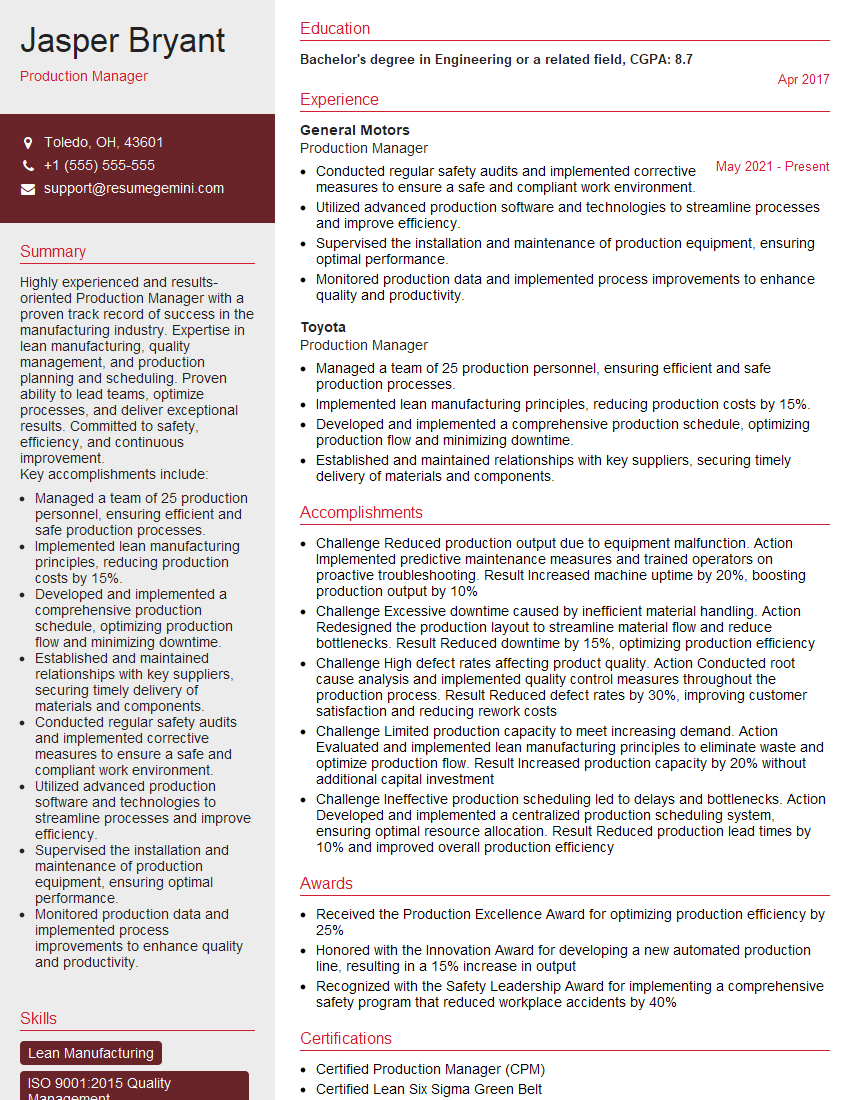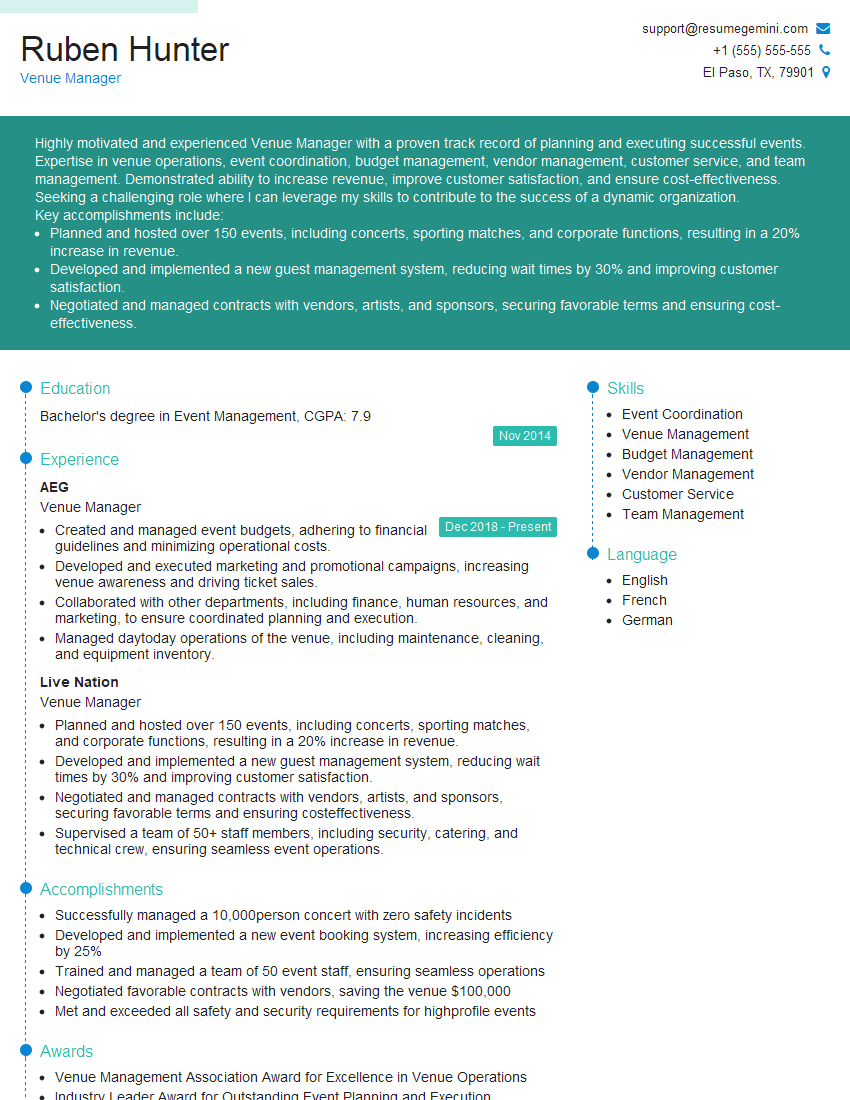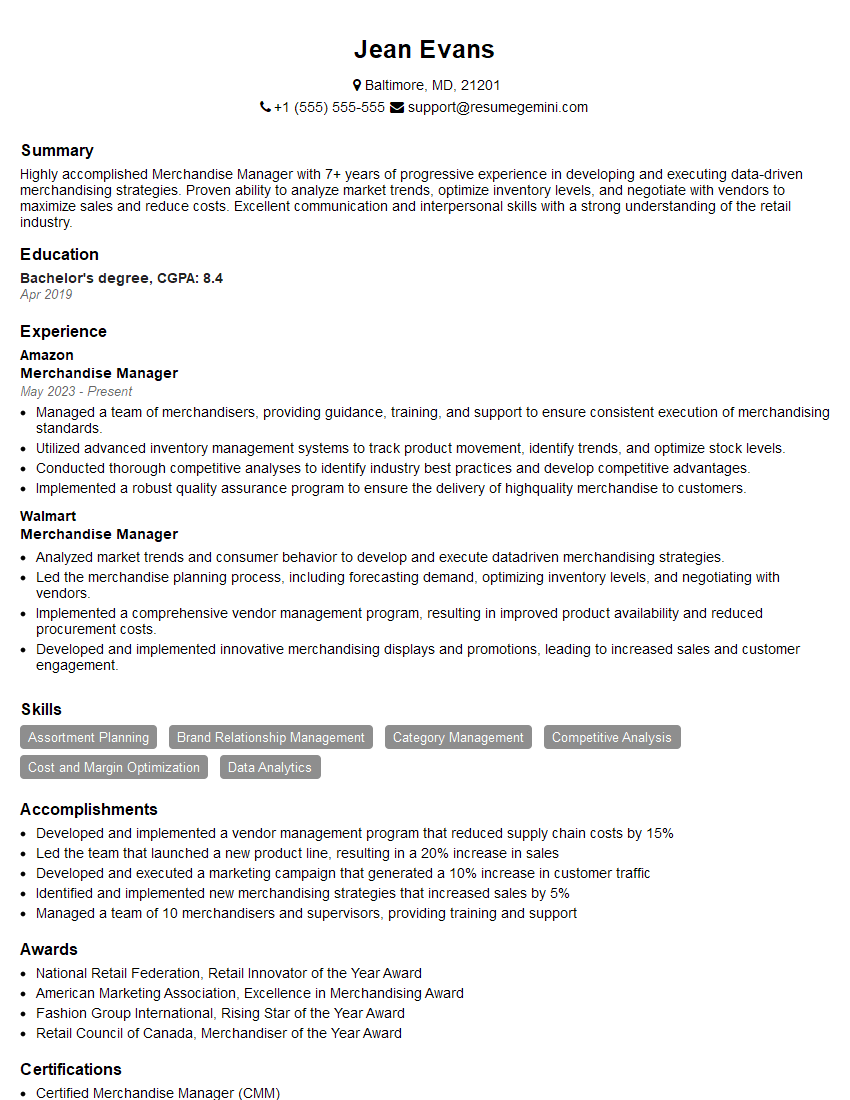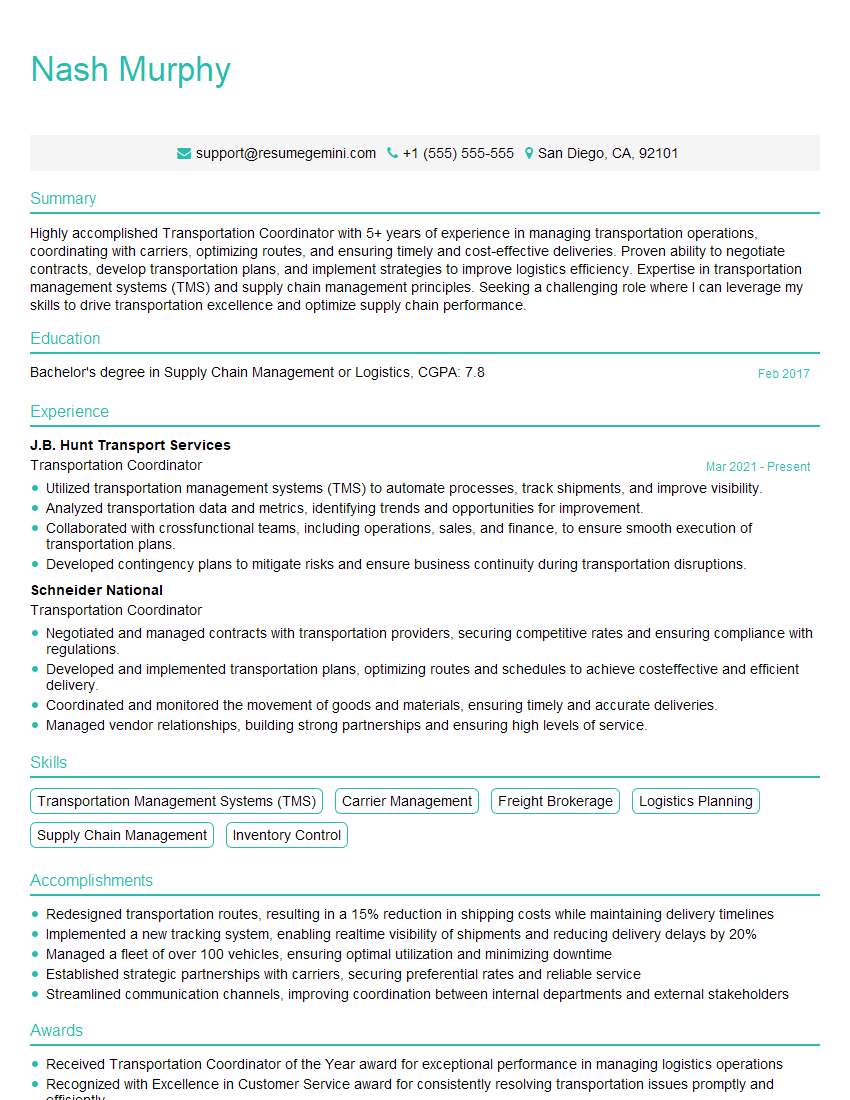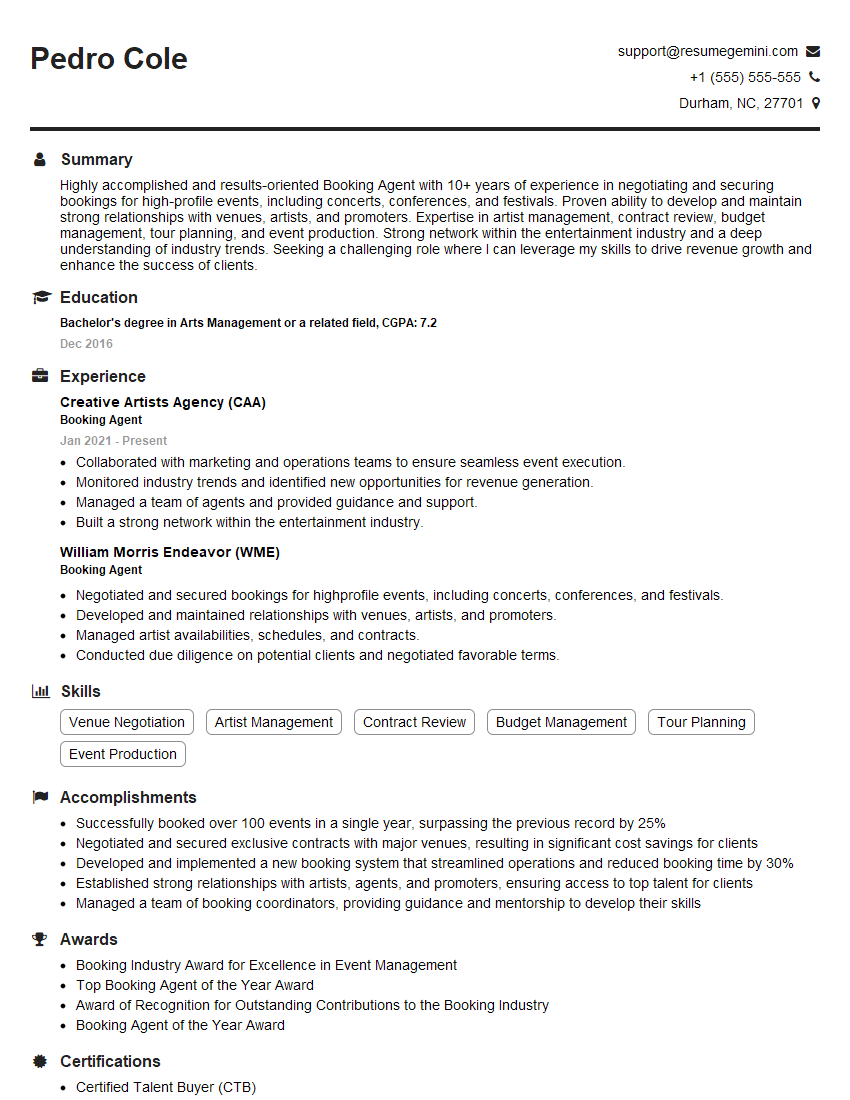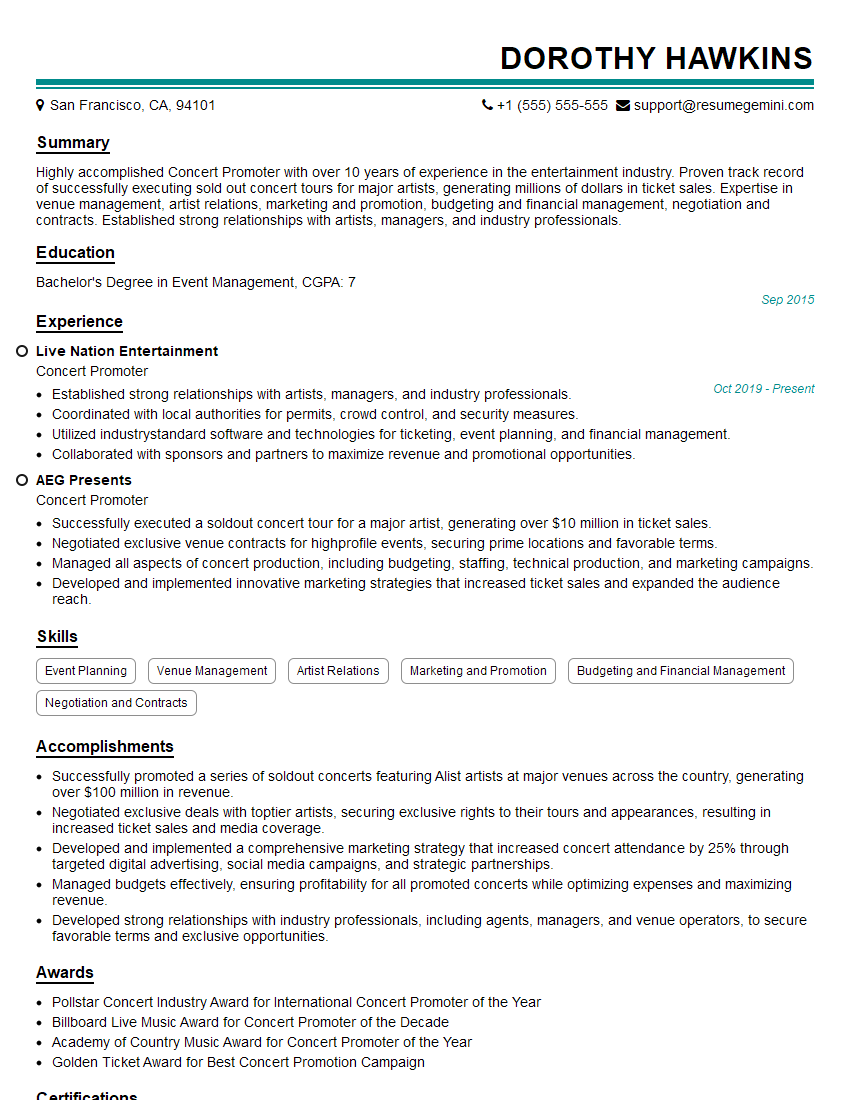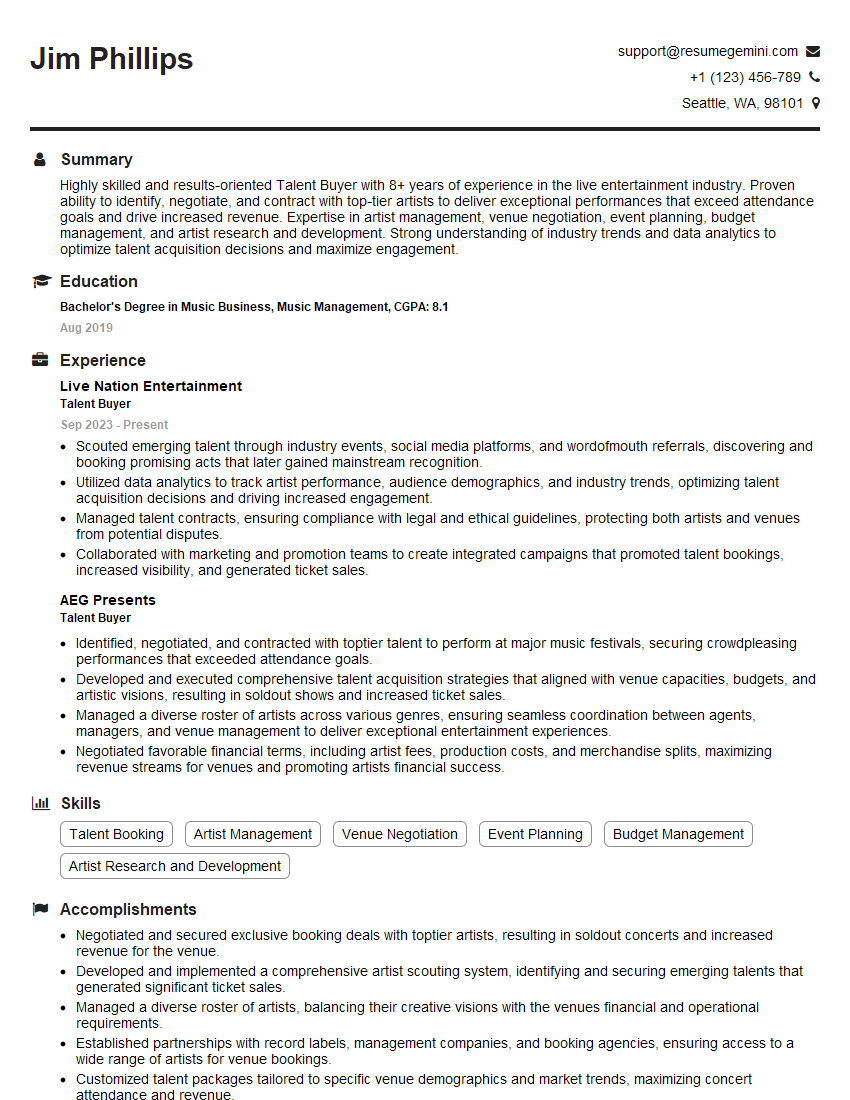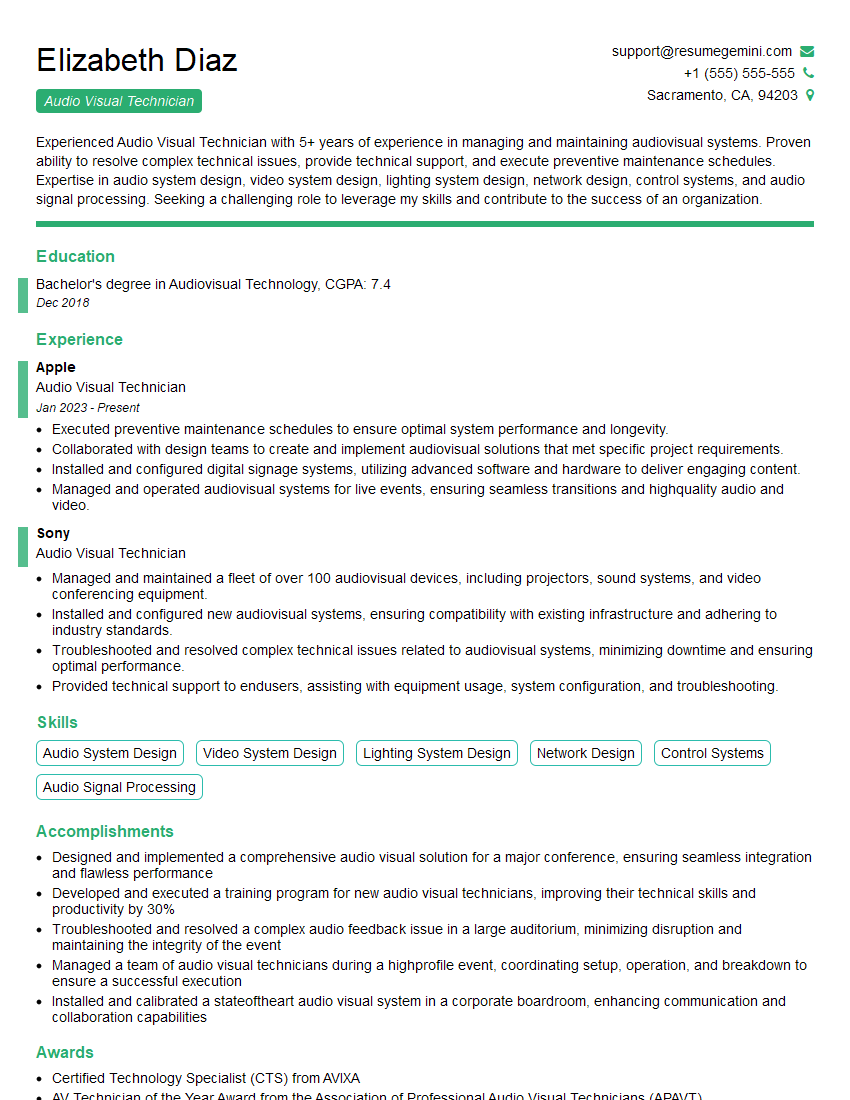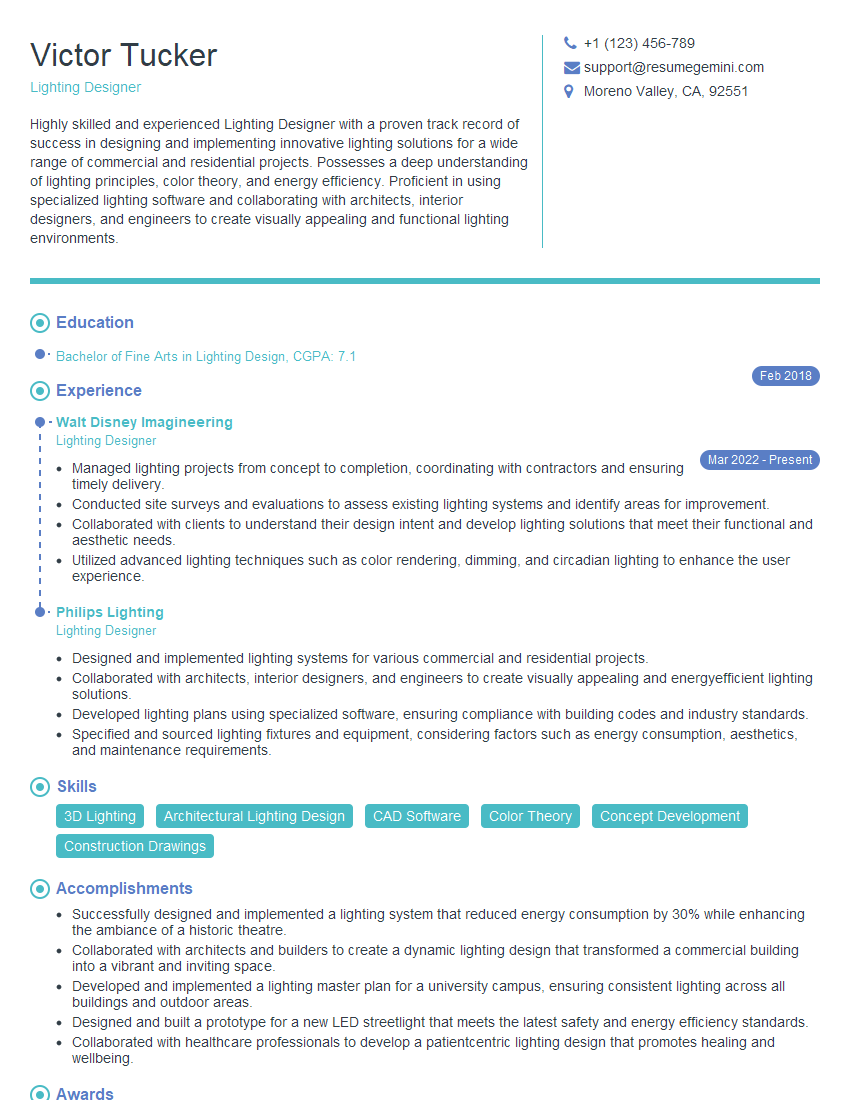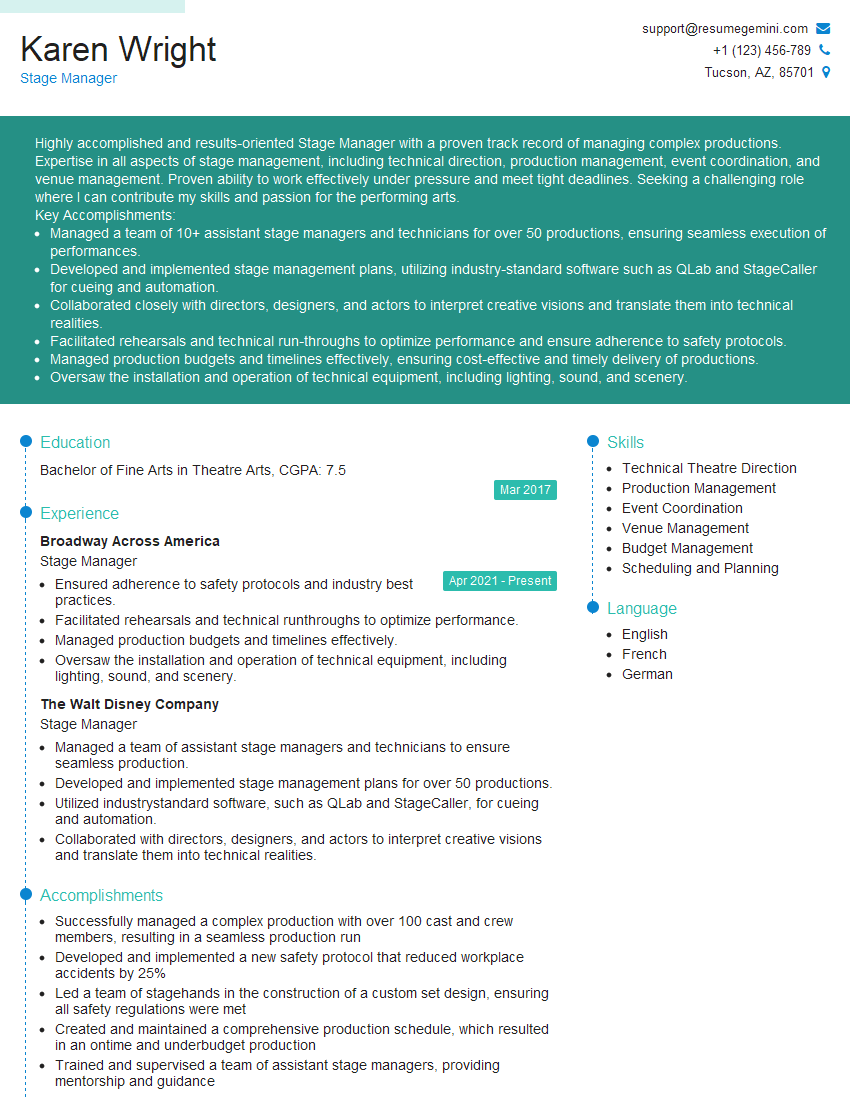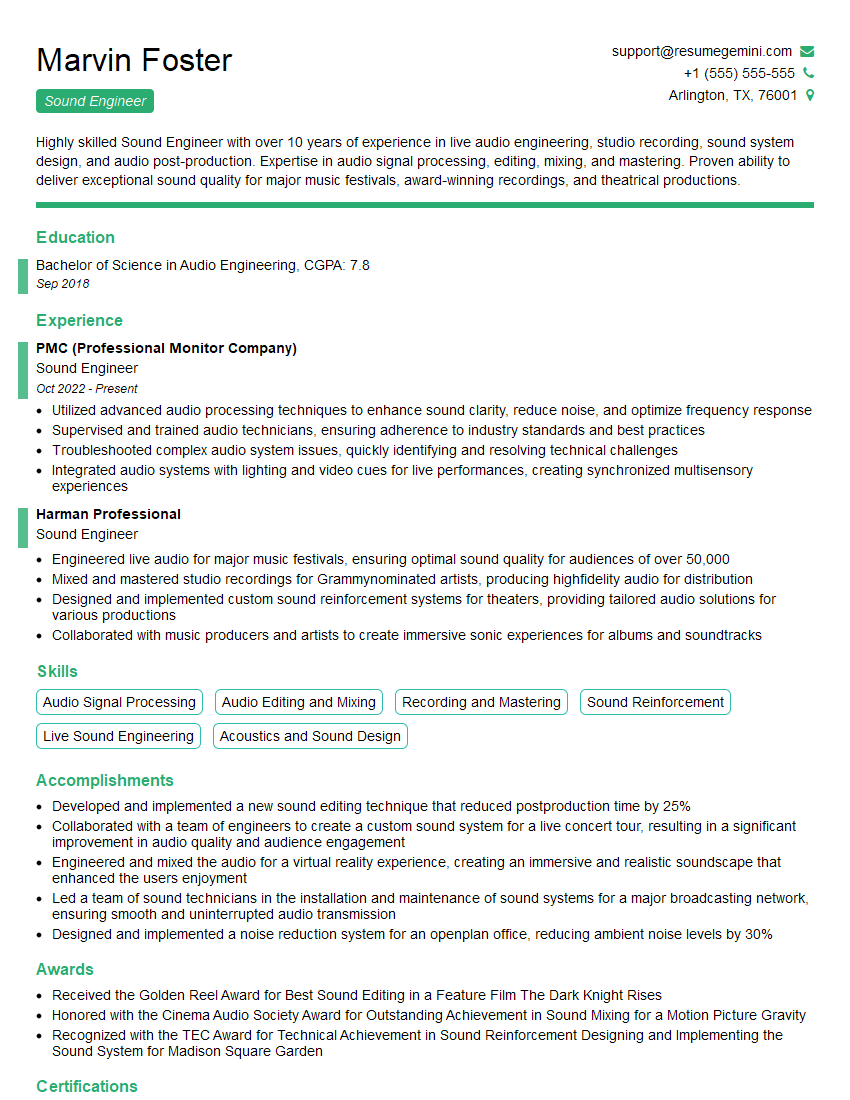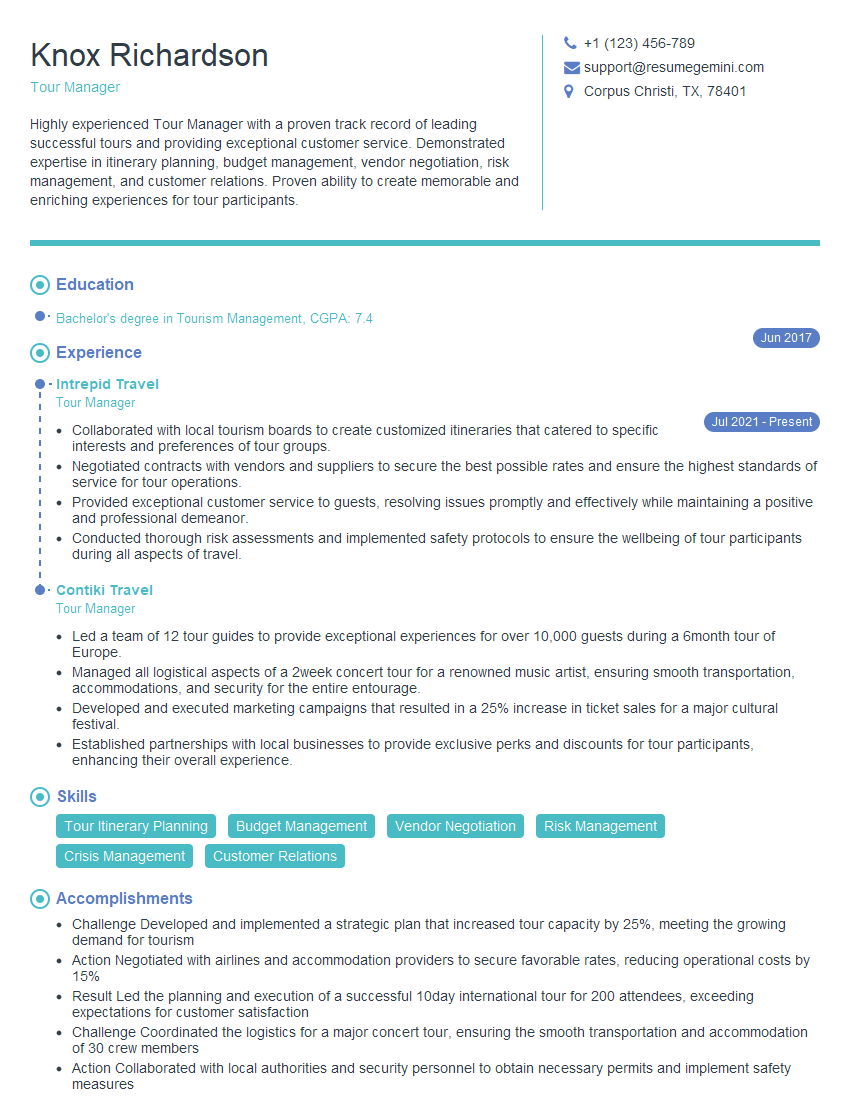Unlock your full potential by mastering the most common Music Concert Management interview questions. This blog offers a deep dive into the critical topics, ensuring you’re not only prepared to answer but to excel. With these insights, you’ll approach your interview with clarity and confidence.
Questions Asked in Music Concert Management Interview
Q 1. Describe your experience with budgeting and financial management in concert production.
Budgeting in concert production isn’t just about numbers; it’s about strategic resource allocation to ensure a profitable and successful event. My approach involves a multi-stage process. First, I create a detailed budget breakdown, encompassing all anticipated expenses: artist fees, venue rental, marketing and advertising, production (lighting, sound, staging), security, insurance, and contingency funds. I use spreadsheet software like Google Sheets or Excel to meticulously track every line item. Then, I develop various scenarios, factoring in potential variations in ticket sales and sponsorship revenue. For example, I might model a ‘best-case’, ‘most-likely’, and ‘worst-case’ scenario to assess risk and plan accordingly. This allows me to identify potential cost-saving measures without compromising the quality of the event. Finally, I regularly monitor expenses throughout the planning and execution phases, making adjustments as needed to stay within budget. I’ve found that robust financial tracking and proactive cost management are crucial for maximizing profitability and minimizing financial risk.
For instance, in one concert, we initially budgeted $10,000 for lighting. By exploring alternative lighting solutions and negotiating with suppliers, we managed to reduce this cost by 15% without compromising the visual quality. This illustrates the importance of consistent cost monitoring and the potential for significant savings through strategic planning and negotiation.
Q 2. Explain your process for negotiating contracts with artists and venues.
Negotiating contracts is a delicate balance of building rapport and protecting interests. My process begins with thorough research into the artist’s or venue’s typical rates and market value. This empowers me to approach negotiations with a well-informed position. I always prepare detailed proposals, clearly outlining all terms and conditions, including performance dates, fees, payment schedules, and responsibilities of each party. Communication is key – I aim for open and transparent dialogue, addressing any concerns proactively. Negotiations often involve compromise, so I’m ready to explore creative solutions to meet both parties’ needs. For example, I might propose a performance-based bonus structure linked to ticket sales, or offer barter arrangements, like providing the artist with promotional support in exchange for a reduced fee. Once an agreement is reached, I ensure that the contract is legally sound and reviewed by legal counsel before finalizing.
In one case, negotiating with a rising star resulted in a performance-based agreement, significantly reducing our upfront costs while providing the artist with strong incentives for successful ticket sales. This strategy proved mutually beneficial, demonstrating the effectiveness of thoughtful negotiation and mutually beneficial agreements.
Q 3. How do you handle logistical challenges, such as unexpected weather or equipment failure, during a concert?
Logistical challenges are inevitable. My approach involves proactive planning and robust contingency strategies. Before the event, we meticulously develop a comprehensive risk assessment, identifying potential problems such as inclement weather, equipment malfunctions, or power outages. For each risk, we formulate a detailed mitigation plan, including backup generators, alternative staging areas (in case of rain), and readily available replacement equipment. During the event, a dedicated team is responsible for monitoring conditions and implementing these plans as needed. Clear communication channels within the team are crucial; a centralized communication system allows for rapid responses to unexpected issues. Finally, post-event analysis reviews the success of our contingency measures, identifying areas for improvement in future events.
For example, during an outdoor concert, we encountered unexpected heavy rain. Our pre-planned mitigation strategy – involving a covered backup stage and rapid relocation of equipment – ensured a smooth transition, minimizing disruption to the event. This exemplifies the value of proactive risk management and detailed contingency planning.
Q 4. What strategies do you use to promote a concert and maximize ticket sales?
Promoting a concert requires a multi-faceted strategy targeting diverse audiences. I utilize a combination of digital and traditional marketing techniques. Digital marketing involves targeted social media campaigns on platforms like Instagram, Facebook, and TikTok, utilizing engaging visuals and videos. Email marketing enables direct communication with potential attendees, while search engine optimization (SEO) helps attract organic traffic. Traditional marketing includes print advertisements in local newspapers and magazines, partnerships with local businesses and radio stations, and pre-event publicity through press releases.
Data analytics plays a significant role. Tracking website traffic, social media engagement, and ticket sales data provides crucial insights into audience behavior and campaign effectiveness. This allows for real-time adjustments to marketing strategies, maximizing the return on investment. Early bird discounts, group offers, and contests can also boost ticket sales. Furthermore, collaborating with influencers or partnering with other events can expand reach and generate excitement.
Q 5. Describe your experience with risk assessment and mitigation in concert planning.
Risk assessment is paramount in concert planning. My approach begins with brainstorming potential risks throughout the event lifecycle, categorizing them by likelihood and impact. This involves considering factors such as artist cancellations, venue issues, security threats, inclement weather, and financial uncertainties. For each identified risk, we develop mitigation strategies, outlining specific actions to reduce the likelihood or severity of the risk. These strategies might involve securing insurance policies, creating contingency plans (as discussed earlier), or implementing robust security protocols.
For instance, the risk of an artist cancellation could be mitigated through a detailed contract, including clauses related to cancellation fees and replacement performers. A thorough risk assessment not only protects the event’s financial stability but also ensures a safe and successful experience for both the artists and the attendees.
Q 6. How do you manage and motivate a team during the stressful period of a concert?
Team management during a concert’s stressful period relies on clear communication, strong leadership, and a supportive environment. Pre-event briefings establish roles, responsibilities, and communication protocols. During the event, open communication channels, such as walkie-talkies or a dedicated communication app, facilitate quick responses to unexpected situations. I emphasize proactive problem-solving, encouraging team members to flag issues early rather than letting them escalate. Regular check-ins provide opportunities to acknowledge hard work and address any concerns. Post-event debriefings offer a chance for reflection, providing constructive feedback and celebrating successes. Creating a positive and collaborative team spirit is crucial for morale and overall performance.
I remember one particularly challenging concert where a crucial piece of sound equipment failed. However, the team’s calm, efficient response – thanks to clear communication and pre-established protocols – ensured a seamless resolution, proving the power of a well-prepared and motivated team.
Q 7. What software or tools do you use for concert planning and management?
Effective concert planning requires a combination of software and tools. For budgeting and financial management, I rely on spreadsheet software like Google Sheets or Microsoft Excel. Project management tools like Asana or Trello help track tasks, deadlines, and team assignments. Ticketing platforms such as Ticketmaster or Eventbrite handle ticket sales and distribution. For communication, I often use Slack or dedicated event management apps. Social media management tools, such as Hootsuite or Buffer, streamline marketing efforts. Finally, audio and video editing software might be required depending on the need for live streaming or post-event content creation.
Using these tools efficiently allows for centralized information management, better collaboration, and informed decision-making, enhancing the entire concert planning process.
Q 8. How do you ensure compliance with all relevant regulations and permits?
Ensuring compliance is paramount in concert management. It involves meticulous planning and proactive engagement with relevant authorities. This begins long before the event itself.
- Licensing and Permits: We start by identifying all necessary licenses and permits – these vary depending on location, venue size, and the nature of the event (e.g., liquor licenses, noise permits, public assembly permits). We then diligently apply for and obtain each one, ensuring all required documentation is complete and submitted well in advance to avoid delays.
- Health and Safety Regulations: We rigorously adhere to all health and safety regulations, including those related to fire safety, crowd control, and emergency procedures. This often involves working with venue managers and local emergency services to develop comprehensive safety plans and conduct regular inspections. For example, we’d ensure adequate emergency exits, clearly marked signage, and trained first aid personnel on-site.
- Copyright and Intellectual Property: We scrupulously respect copyright laws regarding the music performed and any visuals used. This means securing the necessary licenses from performing rights organizations (PROs) like ASCAP, BMI, and SESAC, and ensuring artists have the rights to perform their own material.
- Environmental Regulations: Depending on the venue and scale of the event, we might need to adhere to specific environmental regulations, such as waste management and noise level restrictions. This often includes partnering with sustainable waste disposal companies and utilizing noise-monitoring technology.
Non-compliance can lead to hefty fines, event cancellations, and reputational damage. Therefore, a proactive and documented approach to regulatory compliance is crucial.
Q 9. What is your experience in managing artist riders and backstage requirements?
Managing artist riders and backstage requirements is a critical aspect of concert production, demanding meticulous attention to detail and strong communication skills. An artist’s rider is a detailed list of their technical and hospitality requirements.
- Technical Rider: This specifies the technical equipment needed for the performance (e.g., specific microphones, lighting rigs, sound systems). We carefully review these riders, coordinate with the venue’s technical team to ensure availability, and perform rigorous checks on the day of the event to guarantee everything is set up correctly. For example, a particular artist might require a specific type of drum kit or a certain lighting configuration which must be confirmed and meticulously executed.
- Hospitality Rider: This outlines the artist’s backstage needs, including catering, beverages, dressing room amenities, and transportation. We work closely with catering companies and venue staff to ensure these requirements are met precisely, creating a comfortable and conducive environment for the artist. A simple oversight, like forgetting a specific type of tea requested, could impact the artist’s mood and overall performance.
Effective management here fosters a positive artist experience, leading to smoother performances and potentially better future collaborations. I’ve successfully managed riders for various artists, from indie performers to internationally renowned acts, always prioritizing clear communication and precise execution.
Q 10. How do you handle difficult or demanding artists or clients?
Dealing with demanding artists or clients requires diplomacy, professionalism, and proactive problem-solving. The key is to anticipate potential issues and develop strategies to address them effectively.
- Clear Communication: Maintaining open and honest communication from the outset is essential. Clearly defining expectations, responsibilities, and timelines can prevent many misunderstandings.
- Empathy and Understanding: Understanding the artist’s perspective and needs helps in finding mutually agreeable solutions. Remember, artists are under immense pressure, and a little understanding goes a long way.
- Problem-Solving: When issues arise, we implement a structured approach: identify the problem, explore solutions, negotiate compromises, and document everything. For example, if an artist demands a last-minute change to the stage setup, we explore the feasibility, assess the implications, and find a solution that works within the constraints of time and budget.
- Mediation: In cases of significant conflict, mediation might be necessary. A neutral third party can help facilitate communication and find a resolution that satisfies all parties involved.
Ultimately, our goal is to maintain positive relationships even in challenging situations. A well-managed crisis can enhance an artist’s respect for your professionalism and strengthen your future working relationship.
Q 11. Describe your experience with event security planning and execution.
Event security planning is a multifaceted process that prioritizes the safety and well-being of attendees, artists, and staff. It involves careful assessment of potential risks and implementation of comprehensive security measures.
- Risk Assessment: We conduct a thorough risk assessment that considers various factors such as the venue’s capacity, the expected crowd size, the artist’s profile, and past incidents at similar events. This helps identify potential security threats and vulnerabilities.
- Security Personnel: We engage professional security personnel, including trained guards, ushers, and first responders. Their roles include crowd control, access control, and incident response. Clear communication protocols amongst the security team are paramount.
- Emergency Planning: A detailed emergency plan is crucial, outlining procedures for evacuation, medical emergencies, and security breaches. This plan is shared with all relevant personnel and regularly practiced through drills.
- Technology Integration: Technology plays a crucial role. We often utilize CCTV cameras, metal detectors, and crowd monitoring systems to enhance security and respond to incidents promptly. A real-time monitoring system can allow us to quickly identify and respond to potential threats.
Effective security planning minimizes risks, ensuring a safe and enjoyable environment for everyone. A well-executed security plan contributes to a successful and memorable event.
Q 12. What is your experience with post-event analysis and reporting?
Post-event analysis is crucial for identifying areas of improvement and informing future events. It involves a systematic review of various aspects of the concert.
- Financial Reporting: We analyze financial data, including revenue, expenses, and profitability. This helps evaluate the event’s financial performance and make data-driven decisions for future events.
- Attendance and Sales Data: We analyze ticket sales, merchandise sales, and concession sales to understand audience demographics, purchasing patterns, and overall event popularity.
- Customer Feedback: We collect and analyze feedback through surveys, social media monitoring, and other channels to identify areas for improvement in terms of customer satisfaction and experience.
- Security and Safety Review: We review security procedures and identify any areas needing improvement. This might include adjustments to crowd control measures or enhancements to emergency response protocols.
- Operational Efficiency: We review operational processes, identifying bottlenecks or inefficiencies. This could involve improvements in scheduling, logistics, or communication.
This comprehensive approach allows for continuous improvement and ensures future events are even more successful. Data analysis allows for informed decisions, turning experiences into learning opportunities.
Q 13. How do you manage sponsorships and advertising for concerts?
Sponsorship and advertising are essential for generating revenue and promoting concerts. It involves identifying potential sponsors, developing attractive packages, and executing effective marketing campaigns.
- Identifying Sponsors: We identify potential sponsors whose brand aligns with the event and target audience. This often involves researching companies in relevant industries (e.g., beverage companies, technology firms, clothing brands).
- Developing Sponsorship Packages: We create tailored sponsorship packages that offer various benefits, including branding opportunities, on-site activations, and marketing collateral. These packages are carefully priced to reflect the value provided to the sponsor.
- Marketing and Promotion: We integrate sponsor branding into marketing materials, including promotional campaigns, website banners, and social media posts. We ensure that the sponsor’s branding is prominent and aligned with the overall event identity.
- On-Site Activation: We often collaborate with sponsors to create engaging on-site activations that enhance the attendee experience. This could include interactive booths, product sampling, or photo opportunities.
Successful sponsorship management builds mutually beneficial partnerships, increasing revenue and expanding event reach. It’s a delicate balance between ensuring sponsor visibility and maintaining the overall aesthetic and experience of the concert.
Q 14. What are your strategies for crowd control and safety management during a concert?
Crowd control and safety management are paramount to a successful and safe concert. It’s a proactive process that starts with careful planning and continues throughout the event.
- Venue Capacity and Layout: We carefully consider venue capacity, entry/exit points, and crowd flow dynamics to prevent overcrowding. We work closely with venue managers to optimize the layout for safe crowd movement. For example, clear signage and well-defined pathways are critical for guiding the flow of people.
- Staffing: We employ adequate trained personnel, including ushers, security guards, and medical staff, to manage crowd flow, address emergencies, and assist attendees.
- Communication: Clear communication is vital, using announcements, signage, and social media to inform attendees of safety guidelines, emergency procedures, and potential delays.
- Emergency Procedures: We develop and regularly practice emergency procedures, including evacuation plans, medical response protocols, and security response procedures. We coordinate closely with local emergency services.
- Technology: We may utilize technology such as crowd monitoring systems to analyze crowd density in real-time and identify potential bottlenecks or safety concerns.
Proactive crowd management prevents accidents and ensures a positive and safe experience for all. Effective communication and a well-trained team are crucial for navigating unexpected situations.
Q 15. How do you handle media relations and public relations for a concert?
Media and public relations are crucial for a successful concert. It’s about creating buzz, managing the narrative, and building anticipation. My approach involves a multi-pronged strategy. First, we develop a comprehensive media kit including high-resolution images, artist bios, and detailed event information. This kit is then distributed to key media outlets – newspapers, magazines, blogs, radio stations, and television channels – tailored to their specific interests. We also proactively pitch stories, highlighting unique aspects of the concert or the artist. Second, we leverage social media platforms to engage with fans directly, posting updates, behind-the-scenes content, and interactive polls. Third, we build relationships with key influencers and bloggers within the music scene to generate organic reach. Finally, we monitor media coverage and respond to inquiries promptly and professionally. For example, when managing a concert for a rising indie band, we successfully secured features on major music blogs and local news outlets, resulting in significant ticket sales increases. We also utilized targeted social media campaigns leading to high audience engagement and positive brand sentiment.
Career Expert Tips:
- Ace those interviews! Prepare effectively by reviewing the Top 50 Most Common Interview Questions on ResumeGemini.
- Navigate your job search with confidence! Explore a wide range of Career Tips on ResumeGemini. Learn about common challenges and recommendations to overcome them.
- Craft the perfect resume! Master the Art of Resume Writing with ResumeGemini’s guide. Showcase your unique qualifications and achievements effectively.
- Don’t miss out on holiday savings! Build your dream resume with ResumeGemini’s ATS optimized templates.
Q 16. Explain your understanding of different concert formats (e.g., festival, stadium, arena).
Concert formats vary significantly, impacting logistics, audience expectations, and overall production. A festival involves multiple artists performing over several days or even weeks, often outdoors, requiring extensive site management, multiple stage setups, and diverse logistical planning. Think Coachella or Glastonbury – immense scale, significant infrastructure needs, and diverse audience demographics. An arena concert, on the other hand, typically features one or two headliners in a large indoor venue. The focus is on high-production value, optimal sound and lighting, and efficient crowd flow. Madison Square Garden or The O2 Arena are prime examples. Finally, a stadium concert is the largest format, accommodating tens of thousands, necessitating sophisticated security, extensive staging, and meticulous crowd management. These often feature iconic artists like Taylor Swift or Beyoncé. Each format demands tailored approaches to ticketing, security, and overall event management.
Q 17. Describe your experience in using ticketing platforms and managing ticket sales.
My experience with ticketing platforms is extensive. I’ve worked with industry giants like Ticketmaster, Eventbrite, and See Tickets. My expertise encompasses not only selecting the most appropriate platform based on the concert’s scale and target audience but also overseeing the entire ticketing process. This includes setting ticket prices, managing inventory, implementing dynamic pricing strategies (adjusting prices based on demand), and monitoring sales data in real-time. I also have experience handling pre-sales, VIP packages, and group discounts. Furthermore, I’m proficient in preventing fraud and managing potential issues like ticket scalping. For a recent concert, utilizing a dynamic pricing strategy on Ticketmaster, we saw a 15% increase in revenue compared to our previous event with a fixed pricing model, while also ensuring high ticket availability for genuine fans. Understanding the data analytics offered by these platforms is key to optimizing sales and revenue management.
Q 18. How do you ensure the efficient flow of audience members before, during, and after a concert?
Efficient audience flow is paramount for a positive concert experience and is planned meticulously from entry to exit. Before the concert, clear signage, multiple entry points, and well-staffed entrances are crucial to minimize wait times. We often utilize pre-assigned seating or color-coded entry zones to streamline the process. During the concert, sufficient security personnel, ushers, and readily available assistance points ensure a smooth experience within the venue. This includes managing restroom access, concessions lines, and emergency exits effectively. Post-concert, we plan for staggered exits to avoid bottlenecks. Dedicated staff assists with directing foot traffic and utilizing appropriate transportation options, such as providing clear instructions on public transport and designated pick-up/drop-off zones for ride-sharing services. Careful planning, clear communication, and well-trained staff are key to addressing these points.
Q 19. What experience do you have in managing merchandise sales and inventory?
Managing merchandise sales and inventory demands precise planning and execution. I have experience with both on-site sales and online merchandise stores. This involves forecasting demand, selecting merchandise items relevant to the artist and audience, managing inventory levels to avoid stockouts or overstocking, and overseeing the entire sales process, from ordering and stocking to point-of-sale operations. Efficient barcode systems and point-of-sale (POS) systems, often integrated with online platforms, streamline sales and inventory tracking. We also analyze sales data to understand popular items, pricing strategies, and optimize future stock orders. For example, for a recent tour, we implemented a pre-order online system alongside the physical store, allowing us to forecast demand more accurately and minimize waste. We also tracked real-time sales data, allowing us to replenish popular items swiftly, maximizing sales opportunities.
Q 20. What is your understanding of copyright and licensing agreements in the music industry?
Copyright and licensing in the music industry are complex but essential. It’s crucial to understand that performing copyrighted music requires securing the necessary licenses. These licenses cover the public performance rights, ensuring that the artists and copyright holders receive the appropriate royalties. I work closely with licensing agencies like ASCAP, BMI, and SESAC to secure the correct licenses for every performance. This includes detailed paperwork, accurate reporting, and payment processing. Failure to obtain the necessary licenses can result in substantial legal ramifications and financial penalties. Additionally, securing image and likeness rights for promotional materials and merchandise requires specific permissions from both artists and record labels. Understanding contracts, royalty structures, and the rights held by various parties in the music industry is crucial for navigating this area effectively and legally.
Q 21. How do you measure the success of a concert?
Measuring the success of a concert goes beyond just ticket sales. While ticket revenue is a key metric, we also analyze audience engagement (social media interactions, crowd response), merchandise sales, media coverage, and overall audience satisfaction (through surveys and reviews). Key Performance Indicators (KPIs) include attendance figures, revenue generated (tickets, merchandise, concessions), social media reach and engagement, media coverage (positive sentiment analysis), and post-event surveys to assess fan satisfaction. Comparing these figures against projections and previous events helps determine the overall success and identify areas for improvement in future concerts. A successful concert is one that meets its financial goals, delivers a positive experience for the audience, enhances the artist’s reputation, and provides valuable data for future events.
Q 22. Describe your experience in working with different audio-visual vendors and equipment.
My experience with audio-visual vendors and equipment spans over a decade, encompassing a wide range of projects from intimate acoustic sets to large-scale stadium concerts. I’ve worked with numerous vendors, carefully selecting them based on their reputation, technical capabilities, and cost-effectiveness. This involves detailed pre-production planning, including specifying exact equipment needs – everything from microphones and speakers to lighting rigs and video projectors. I understand the nuances of different audio systems, including line arrays, point source speakers, and their optimal placement for various venue acoustics. For example, in one outdoor festival, I collaborated with a vendor specializing in weatherproof equipment to ensure a flawless performance despite unpredictable weather. Another project required a complex video mapping system, so I selected a vendor with expertise in that specific technology. Thorough testing and communication with the vendors is key to ensuring seamless integration of all AV elements during the event. Post-event, I meticulously review vendor performance, including adherence to timelines, budget, and quality of service, to inform future collaborations.
Q 23. What is your experience in managing volunteer staff or crews?
Managing volunteer staff and crews is a crucial part of concert production. My approach involves clear communication, meticulous planning, and a strong emphasis on training. Before the event, I develop detailed volunteer role descriptions, outlining responsibilities and reporting structures. I also conduct thorough training sessions, covering safety protocols, event logistics, and specific task assignments. During the event, I maintain consistent communication with the volunteers, addressing any concerns or questions promptly. I foster a positive and supportive environment where everyone feels valued and empowered to contribute. In one instance, we had a last-minute volunteer shortage. By leveraging my pre-established communication network and clear volunteer guidelines, I was able to quickly recruit and deploy replacements with minimal disruption to the event flow. Effective volunteer management is about building a team, ensuring they’re well-prepared, and creating a collaborative atmosphere.
Q 24. How do you handle unexpected changes or cancellations?
Unexpected changes and cancellations are an inherent part of the concert industry. My strategy focuses on proactive planning, contingency management, and efficient communication. This includes having backup plans for potential issues, such as alternative venues, artists, or equipment suppliers. For instance, I always have a list of reliable vendors on standby. If an artist cancels, my immediate response involves communicating with all stakeholders – ticketing agencies, sponsors, and the audience – as transparently and quickly as possible. We explore options for rescheduling, finding a replacement artist, or offering refunds, always prioritizing a fair and equitable outcome. In one instance, a severe storm threatened to halt an outdoor concert. By having a backup indoor venue arranged and flawlessly executing the contingency plan, I ensured a successful event despite the unexpected challenge. Adaptability and decisive action are crucial in navigating these unexpected situations.
Q 25. Describe your understanding of health and safety regulations in concert environments.
Understanding health and safety regulations is paramount in concert environments. My knowledge encompasses local, regional, and national regulations regarding crowd control, emergency exits, fire safety, and first aid. I ensure all venues comply with these regulations and work closely with venue management and safety officers to develop comprehensive safety plans. These plans include risk assessments, emergency procedures, and clear communication channels during the event. All staff and volunteers receive detailed safety training, covering topics such as crowd management techniques, handling emergencies, and recognizing potential hazards. We use clearly marked evacuation routes, sufficient security personnel, and readily available first-aid resources. Regularly reviewing and updating safety plans based on best practices and evolving regulations is crucial to ensure the well-being of everyone involved.
Q 26. What is your experience with marketing and advertising on social media platforms?
My experience with social media marketing is extensive. I leverage platforms like Facebook, Instagram, Twitter, and TikTok to reach target audiences and promote concerts. This involves creating engaging content – high-quality photos and videos, behind-the-scenes glimpses, artist interviews – to build excitement and anticipation. I also utilize targeted advertising campaigns to reach specific demographics and interests, maximizing our marketing reach. Analyzing social media analytics is essential to track campaign performance and adjust our strategies accordingly. For example, during one campaign, we discovered that short, engaging video clips performed significantly better than longer posts on TikTok. This insight allowed us to optimize our content strategy and increase audience engagement significantly. Effective social media marketing requires creativity, data-driven decision-making, and consistent effort.
Q 27. How do you prioritize tasks and manage your time effectively during a concert?
Prioritizing tasks and managing time effectively during a concert requires a structured approach. I utilize project management tools and techniques like Gantt charts to visualize the timeline and dependencies of various tasks. I break down the concert production into smaller, manageable tasks, assigning responsibilities and deadlines to team members. This involves creating detailed checklists and utilizing communication tools to ensure everyone stays informed and on track. During the event, I use a prioritized task list, focusing on critical aspects and delegating tasks efficiently to my team. I also build in buffer time to account for unexpected delays. Maintaining clear communication channels, using efficient communication methods, and regular check-ins help keep everything running smoothly. It’s all about planning meticulously, delegating effectively, and adapting to the ever-changing dynamics of a live concert.
Q 28. Describe a time you had to solve a complex problem related to concert production.
In one instance, a major power outage occurred just minutes before the headliner was scheduled to take the stage. This presented a complex problem, potentially ruining the event and causing significant financial losses. My immediate response involved a multi-pronged approach. First, I contacted the venue’s technical team and emergency power supplier to assess the situation and explore potential solutions. Simultaneously, I communicated with the artist’s management team, keeping them informed and exploring potential adjustments to their performance. Finally, I addressed the audience, explaining the situation transparently and assuring them we were working towards a solution. We managed to secure emergency power within 30 minutes, minimizing disruption and allowing the concert to continue with minimal impact on the audience experience. This experience highlighted the importance of proactive risk management, effective communication, and the ability to swiftly adapt to unexpected crises.
Key Topics to Learn for Music Concert Management Interview
- Artist Management: Understanding artist contracts, rider requirements, and performance negotiations. Practical application: Developing a budget and schedule that accommodates artist demands while maximizing profitability.
- Venue Relations: Building and maintaining positive relationships with venues, including negotiating rental agreements and understanding venue capacities and limitations. Practical application: Securing optimal venue options for different artist types and audience sizes.
- Marketing & Promotion: Developing and implementing marketing strategies across various channels (social media, ticketing platforms, traditional advertising). Practical application: Analyzing campaign effectiveness and adjusting strategies based on data.
- Ticketing & Sales: Understanding ticketing platforms, sales strategies, and revenue projections. Practical application: Optimizing ticket pricing and sales strategies to maximize revenue and minimize unsold tickets.
- Budgeting & Finance: Creating detailed budgets, managing expenses, and tracking revenue streams. Practical application: Developing contingency plans to address unforeseen financial challenges.
- Logistics & Production: Overseeing all aspects of concert production, including stage setup, sound and lighting, security, and catering. Practical application: Troubleshooting logistical challenges and ensuring a smooth and efficient concert experience.
- Risk Management: Identifying and mitigating potential risks associated with concerts, including safety concerns, legal liabilities, and weather-related issues. Practical application: Developing comprehensive risk assessment plans and implementing appropriate mitigation strategies.
- Teamwork & Communication: Effective communication and collaboration with various stakeholders, including artists, venue staff, contractors, and marketing teams. Practical application: Leading and motivating a team to achieve shared goals and overcome challenges.
Next Steps
Mastering Music Concert Management opens doors to exciting career opportunities within the vibrant music industry. From independent promoters to large-scale event companies, your skills will be highly sought after. To significantly enhance your job prospects, creating a compelling and ATS-friendly resume is crucial. We strongly recommend utilizing ResumeGemini, a trusted resource designed to help you build a professional and effective resume. ResumeGemini provides examples of resumes tailored to Music Concert Management, offering invaluable guidance as you craft your application materials. Invest in your future – build a resume that showcases your potential!
Explore more articles
Users Rating of Our Blogs
Share Your Experience
We value your feedback! Please rate our content and share your thoughts (optional).
What Readers Say About Our Blog
Hello,
We found issues with your domain’s email setup that may be sending your messages to spam or blocking them completely. InboxShield Mini shows you how to fix it in minutes — no tech skills required.
Scan your domain now for details: https://inboxshield-mini.com/
— Adam @ InboxShield Mini
Reply STOP to unsubscribe
Hi, are you owner of interviewgemini.com? What if I told you I could help you find extra time in your schedule, reconnect with leads you didn’t even realize you missed, and bring in more “I want to work with you” conversations, without increasing your ad spend or hiring a full-time employee?
All with a flexible, budget-friendly service that could easily pay for itself. Sounds good?
Would it be nice to jump on a quick 10-minute call so I can show you exactly how we make this work?
Best,
Hapei
Marketing Director
Hey, I know you’re the owner of interviewgemini.com. I’ll be quick.
Fundraising for your business is tough and time-consuming. We make it easier by guaranteeing two private investor meetings each month, for six months. No demos, no pitch events – just direct introductions to active investors matched to your startup.
If youR17;re raising, this could help you build real momentum. Want me to send more info?
Hi, I represent an SEO company that specialises in getting you AI citations and higher rankings on Google. I’d like to offer you a 100% free SEO audit for your website. Would you be interested?
Hi, I represent an SEO company that specialises in getting you AI citations and higher rankings on Google. I’d like to offer you a 100% free SEO audit for your website. Would you be interested?
good
